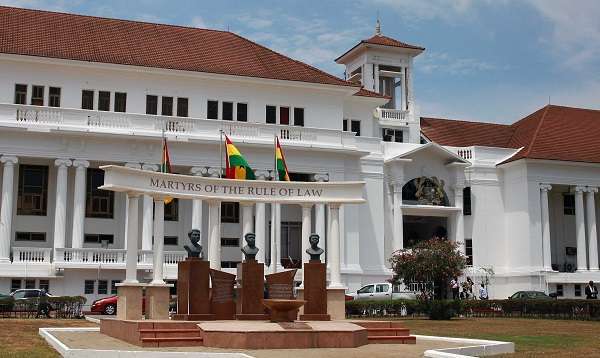Mr. Kofi Bentil has backed the Supreme Court’s assumption of jurisdiction in the controversial constitutional interpretation case between Parliament versus the Supreme Court.
His arguments revolved around the need for clarity in constitutional matters, the appropriate forum for such disputes, and dissenting opinions on the ruling.
“The Supreme Court has made clear, using cases and explaining at length, that one, it is beyond that, that whenever there is a constitutional interpretation issue, it belongs in the Supreme Court. That is beyond doubt. Nobody argues that.”
Kofi Bentil Legal Practioner and Vice President of IMANI Centre for Policy and Education
Mr Bentil strongly debunked the many legal quandaries to the dissenting opinions that the Constitutional provision on which the Speaker made the declaration is so clear and that there is no need for a further interpretation thus the Supreme Court’s involvement. He considered such reasoning flawed.
“The fact that you have a view, and I have a different view, showed clearly that there needed to be somebody to break that, you know, jam. So, the Supreme Court was effectively, I mean, properly invoked just because there was disagreement.”
Kofi Bentil Legal Practioner and Vice President of IMANI Centre for Policy and Education
Concurrent Jurisdiction and Efficiency in Adjudication
Mr. Bentil went on to highlight the issue of concurrent jurisdiction between the High Court and the Supreme Court.
“When in one case, you have matters of interpretation and then other matters which are specifically given to, let’s say, a high court, the Supreme Court must necessarily take it. Because you don’t want the situation where it goes there, [then] comes back, and then it goes there, wasting everybody’s time.”
Kofi Bentil Legal Practioner and Vice President of IMANI Centre for Policy and Education
The Supreme Court’s decision to assume jurisdiction, according to Mr Bentil, was both logical and efficient.
He pointed out that constitutional issues should not be fragmented across different courts when they can be resolved holistically by the apex court.
A Dissenting Opinion

While Mr. Bentil supported the Supreme Court’s ruling he acknowledged the dissenting view of Justice Issifu Omoro Tanko Amadu.
He strongly opposed the majority’s decision, arguing that it undermined the High Court’s constitutional prerogative. However, Justice Tanko Amadu’s interjection stated clearly with the very words;
“I do not hasten to proclaim that I have apprehended with despair the majority’s conclusion in this suit, but I state with utmost deference to the honorable Chief Justice and the rest of my brethren in the majority that not only do I fundamentally disagree with their conclusion, I, with all due respect, also find the decision an aberration to the established and accepted judicial position of this court.”
Issifu Omoro Tanko Amadu Supreme Court Judge
Justice Amadu against the backdrop has earlier expressed hope that the decision would eventually be reversed, labeling it a usurpation of the High Court’s jurisdiction.
Settled Judicial Principles

Mr. Bentil highlighted that the Supreme Court’s ruling was consistent with the necessary established judicial precedents.
He referred to page 33 of the ruling, where the court cited previous cases to reinforce its stance. Also, page 12 of the last paragraph of the same document from the Supreme Court stated that;
“This court reiterated the settled position of the law that this court’s original jurisdiction under article 2(1) is not necessarily ousted just because there is, within the same course of action, a concurrent jurisdiction vested in the High Court.”
The Supreme Court
The Supreme Court underscored its authority to interpret constitutional provisions even when other courts have overlapping jurisdiction, ensuring coherence in legal principles.
Balancing Jurisdictional Authority
Mr. Bentil acknowledged the complexity of balancing jurisdictional authority between courts.
However, he argued that the Supreme Court’s assumption of jurisdiction was warranted given the significance of the constitutional issues at stake.
“In short, this case clearly had a matter that could have gone to the High Court if there was no interpretation issue.
But because it came together with an interpretation issue, then the proper thing to do was for the Supreme Court to take it and deal with it. Because the Supreme Court is higher than a higher court.”
Kofi Bentil Legal Practioner and Vice President of IMANI Centre for Policy and Education
He further stressed that the Supreme Court’s decision prevented potential delays and confusion that might arise from splitting jurisdiction.
Mr. Bentil’s analysis of the Supreme Court’s ruling highlighted the importance of clarity and efficiency in constitutional interpretation. His argument was encapsulated in his concluding remarks;
“So, for the Supreme Court to assume it with all due respect, was the sensible thing to do, and that is what they did.”
Kofi Bentil Legal Practioner and Vice President of IMANI Centre for Policy and Education
Mr. Bentil’s perspective reaffirmed the Supreme Court’s pivotal role in resolving constitutional disputes, ensuring consistency in legal interpretations and preventing unnecessary judicial delays.
READ ALSO; Michy To Be Crowned a Queen in Aburi

















